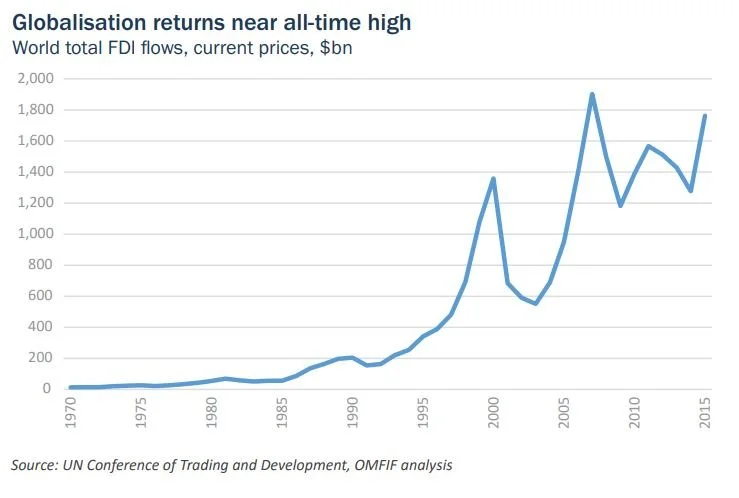Asia’s role in globalisation debate
East-West contrast on benefits of international trade
Discussions about globalisation in the West and in Asia often employ two different narratives about the causes of economic distortions and associated policy conclusions. A new contrast appears to be opening up, accentuated by President Donald Trump’s espousal of the view that ‘protection will lead to great prosperity and strength’. Asian supporters of globalisation call for political leadership to communicate the benefits effectively, and pursue globalisation further. If the West is now reluctant, the East is prepared to take over that role.
Loss of jobs and control
One version of economic and political developments, rather prevalent in the West, blames globalisation for the loss of jobs and perceived loss of control over industry. Leave campaigners in Britain’s European Union referendum argued that the EU, which could be considered the most advanced example of globalisation, had pushed integration too far. Their conclusion was that globalisation must be stalled, or at least partly unwound, to regain control.
The other school of thought, often heard in Asia, points to poor domestic policy-making and political short-termism as the chief cause of discontent. As Chinese President Xi Jinping said at the World Economic Forum meetings in Davos, ‘Just blaming economic globalisation for the world’s problems is inconsistent with reality, and it will not help solve the problems.’
Proponents of this view argue that technological advances have had a greater impact than globalisation on unemployment in western countries. This line of thinking highlights that western working and middle classes benefit from lower prices and a wider range of goods produced all over the world.
False promise of protectionism benefits
Both points of view have some credibility, though each misses something important. Unwinding globalisation will not make the US working class better off. American manufacturing exports supported nearly 7m jobs in 2015. Transatlantic trade and investment relations support up to 15m jobs on both sides of the Atlantic. In the face of restrictions on trade and investment, the US economy would be unlikely to lift domestic demand to offset losses in foreign activities.
“ Globalisation can offer benefits to all countries, as long as it is accompanied by principles that ensure all participants follow the same rules.
That said, companies in some countries, such as China, with market capitalisation among the top 100 globally, are supported by distortive state intervention. It is hard to justify why this is the case to European businesses, which must abide by stricter regulations and competition rules. As Xi said in Davos, China has undertaken many reforms and contemplates further liberalisation.
On the other hand, globalisation sceptics have a point. Disregarding the legitimate voices expressed via the democratic process is neither fair nor politically sustainable. Western governments cannot remain blind to the examples of lower social mobility and equality of opportunity that have flowed in globalisation’s wake.
G20 Hangzhou consensus
Internationalisation can offer benefits to all countries, as long as it is accompanied by principles that ensure all participants follow the same rules. The G20 leaders put forward one such model in the ‘Hangzhou consensus’ in September 2016, which addressed the need for inclusive, innovative growth between open markets.
The revised model involves traditional structural reforms and market opening to boost growth, an improvement in global economic governance, and sound predistributive and distributive policies.
The G20, now under German presidency, can encourage both West and East to give meaning to this consensus. It should build on existing ventures such as the European Commission Investment Plan for Europe and the Chinese-led Belt and Road Initiative.
Fairer globalisation initiatives can find inspiration in the high standards of the EUCanada trade agreement, which includes provisions on competition, state-owned enterprises, government procurement contracts and regulatory co-operation. Those wishing enforced standards can learn from EU initiatives to address distortions by some large multinational corporations. Asian countries meanwhile provide good examples of successful education and social inclusion policies.
Pursuing globalisation while correcting its unintended distortions and distributional effects provides the right framework for successful co-operation between East and West. The overriding message is that such reforms must invariably be managed by political and business leaders. But they must deliver benefits for all members of society if globalisation is to be sustainable. ▪
Published in the Official Monetary and Financial Institutions Forum Bulletin.
